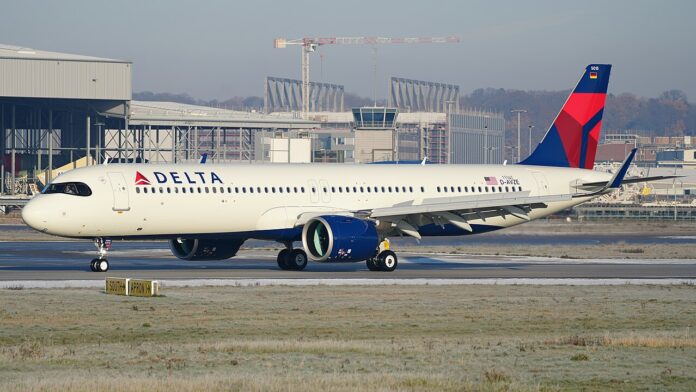Delta Air Lines’ New Airbus A321neo Aircraft: A Grounded Promise of Premium Travel
Introduction
In a highly anticipated development for air travelers, Delta Air Lines has welcomed five new Airbus A321neo aircraft into its fleet. Designed to elevate the passenger experience with flat-bed Delta One seats, these aircraft promise a competitive edge in the premium travel market. However, despite their delivery, they remain grounded due to pending cabin certification, leaving many eager travelers in wait.
The Delayed Arrival of New Aircraft
Initially slated for entry into service in 2024, these five A321neo aircraft are configured specifically for premium transcontinental routes from major hubs like New York (JFK) and Los Angeles (LAX). Unfortunately, certification delays have led to their current storage, creating uncertainty about their operational timeline. Airlines seldom store brand-new aircraft unless absolutely necessary, and in this case, the holdup is linked to the certification of their sophisticated cabins.
A Closer Look at the Aircraft’s Configuration
Delta’s decision to utilize the A321neo model stems from a broader strategy to enhance passenger comfort and compete in the premium market segment. Of the 155 A321neos Delta has on order through 2027, a special configuration will feature 21 aircraft outfitted in a more luxurious layout.
Seating Breakdown:
-
16 Delta One seats: This premium business class features a 1-1 reverse herringbone design with full-flat beds and privacy doors, setting a new standard for narrowbody aircraft.
-
12 Delta Premium Select seats: A comfortable 2-2 layout provides a premium economy experience, comparable to first class on domestic flights.
-
54 Comfort+ seats: These extra-legroom options are arranged in a 3-3 configuration, providing a more spacious economy experience.
- 66 Main Cabin seats: The standard economy layout is also a 3-3 configuration, catering to more budget-conscious travelers.
Why Are the Planes Grounded?
Despite their impressive specifications, the new A321neos are currently stored in various locations:
-
Victorville (VCV): Three aircraft (N551DT, N552DT, N553DT) delivered in late 2024 and early 2025.
- Toulouse (LFBF): Two additional aircraft (N555DE, N554DT) delivered mid-2025.
The primary reason for their inability to take off is the obstruction in obtaining the necessary cabin certification. The continued delay raises questions about Delta’s operations and the broader impact delays have on the supply chain within the aviation industry.
Strategic Implications for Delta Air Lines
Delta’s strategy to deploy these A321neos on high-demand premium routes highlights a significant shift in operational focus. Previously dominated by older 757s and 767s, Delta aims to use A321neos to compete directly with airlines such as JetBlue and American Airlines, which have set the bar with modern, flat-bed seating in their narrowbody fleets.
The A321neo’s smaller capacity allows for increased frequency and premium offerings, which offers several advantages:
-
Higher flight frequency: A321neos can operate more routes, catering to fluctuating premium demand.
-
Modern cargo solution: They represent a contemporary alternative to aging 757s, which struggle to meet competitive cabin standards.
- Gradual fleet evolution: The phased approach enables Delta to transition 767-400ERs toward long-haul international routes.
Navigating the Competitive Landscape
Delta isn’t entering a market devoid of competitors. Airlines such as JetBlue and American Airlines have already established themselves with compelling offerings in narrowbody premium travel. JetBlue’s Mint is particularly known for its spacious suites, while American Airlines is set to upgrade its own offerings with the upcoming Airbus A321XLR.
United Airlines is also on the cusp of enhancing its fleet with flat-bed cabins on Boeing 737 MAX 10 aircraft. This collective movement indicates a trend that is redefining domestic travel, particularly within the premium segment.
Looking Forward
With five grounded A321neos and the potential for many more to follow, Delta’s future in the premium travel sector looks promising yet uncertain. The ongoing certification process will ultimately dictate when these innovative aircraft can enter the skies, an essential step in fulfilling Delta’s vision of transforming domestic premium travel.
In summary, Delta Air Lines is poised to reimagine its premium travel offerings with the Airbus A321neo. The importance of these aircraft extends beyond their individual specs; they represent a strategic pivot in how Delta intends to serve premium customers amid an evolving competitive landscape. As the aviation landscape continues to shift, all eyes will remain on Delta’s next steps and the eventual incorporation of these jets into its operational fleet.
